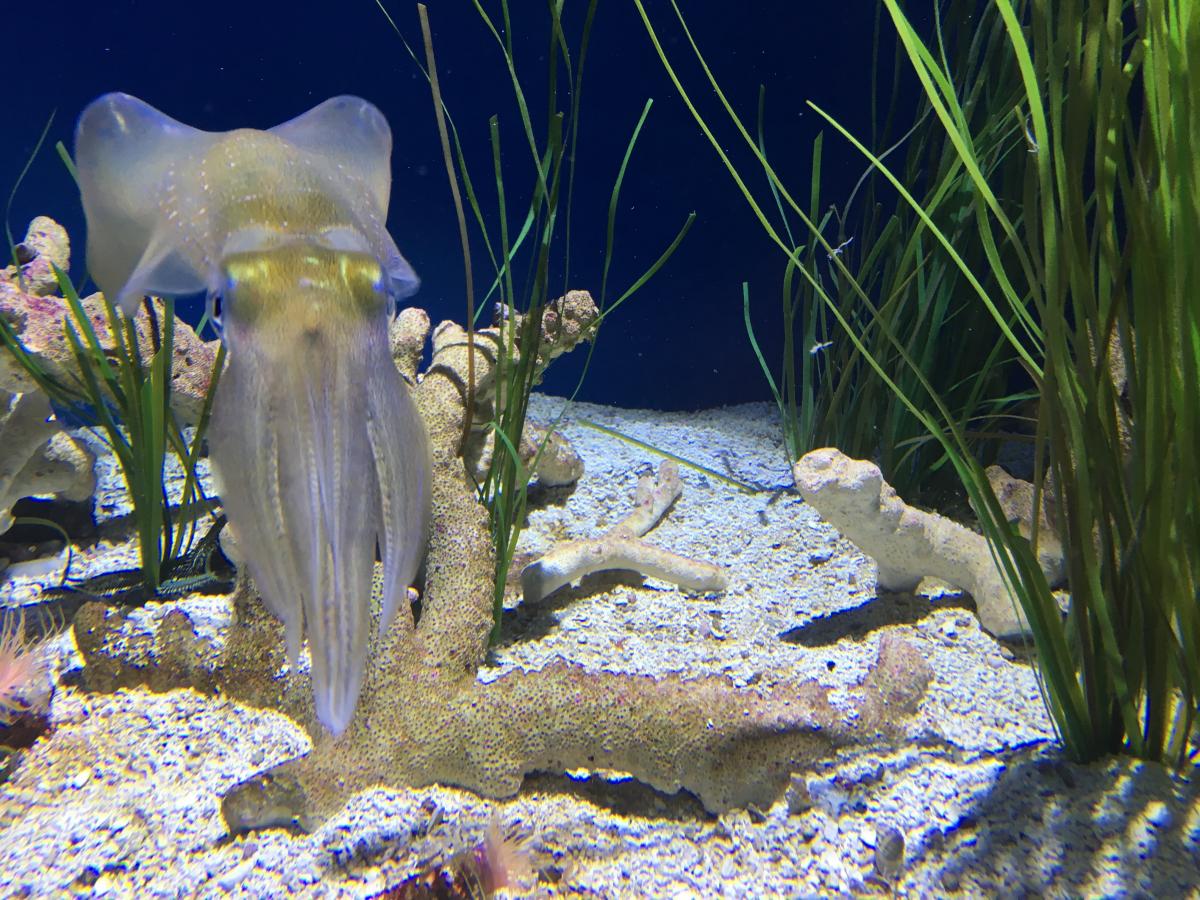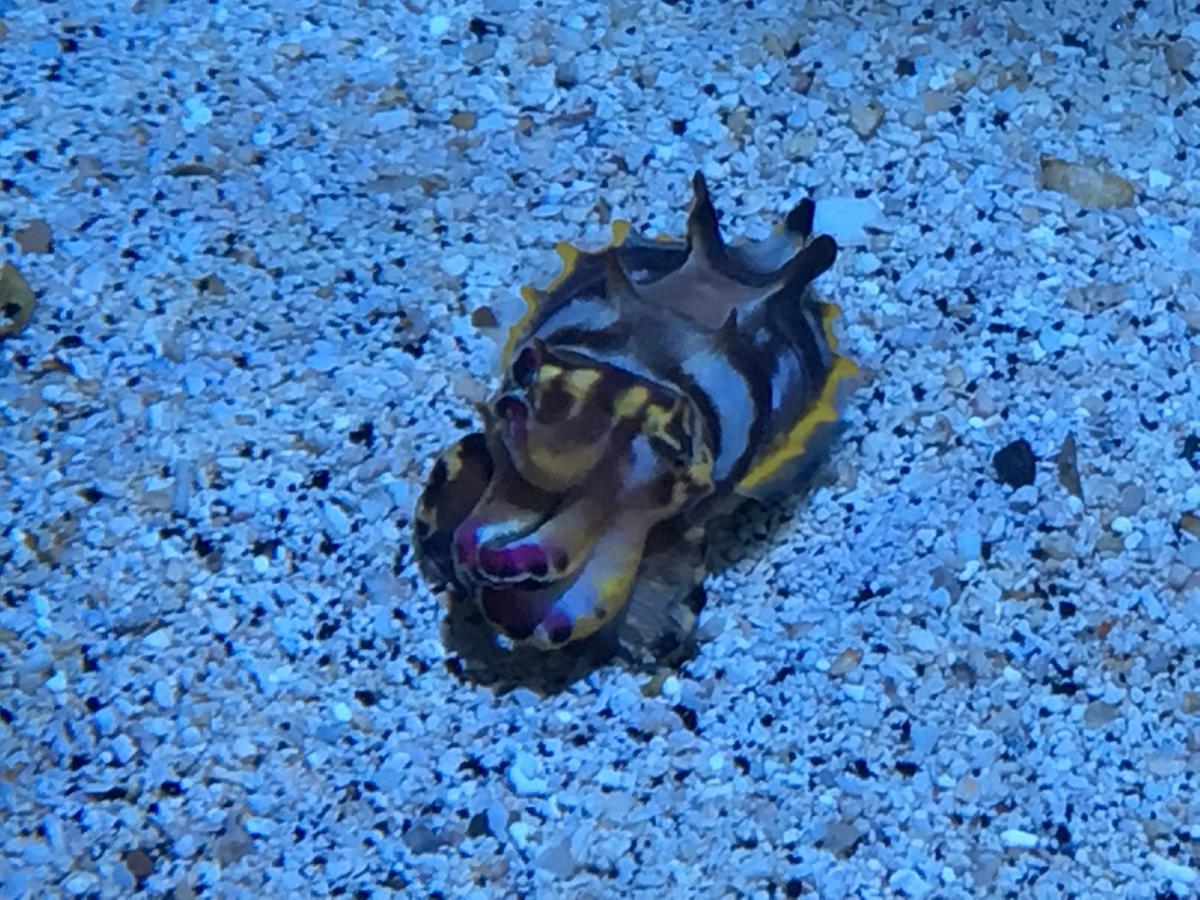We talk about cephalopods (such as squids, octopoduses [or octopodes, not octopi!]), and cuttlefish) a lot at NCSE. Not because we need to but because we like to. As regular readers know, while xenarthrans rule as my favorite all-time vertebrate group, cephalopods reign supreme in my heart among invertebrates. I knew I had found a  home at NCSE when Glenn Branch and Josh Rosenau revealed themselves as fellow cephalopodophiles, even if they maintain it’s still okay to eat them, which, I’m sure you agree (and if you don’t, don’t tell me), should be entirely against the rules—any rules. So, given this background, you won’t be surprised to hear that my interest was piqued when Ann Reid sent an e-mail to staff with the subject “cephalopods: the seamy underside.” It read:
home at NCSE when Glenn Branch and Josh Rosenau revealed themselves as fellow cephalopodophiles, even if they maintain it’s still okay to eat them, which, I’m sure you agree (and if you don’t, don’t tell me), should be entirely against the rules—any rules. So, given this background, you won’t be surprised to hear that my interest was piqued when Ann Reid sent an e-mail to staff with the subject “cephalopods: the seamy underside.” It read:
I’m throwing this red meat to the cephalopod lovers of NCSE, then quickly ducking. Is it actually an environmental imperative to eat them?
Obviously the answer is no. It didn’t matter to me what the linked article said; there is no way it is imperative to eat these majestic and brilliant creatures. But, before I rattled that off as a reply, I figured I should click the link—just to dot my i's. The article, from Discovery News, entitled “Squid—‘Weeds of the Sea’—on the Rise,” summarizes a new study published in Current Biology about long-term cephalopod population trends. After reading that article, and a few other summaries, I was able to reply to Ann Reid’s e-mail:
All I get from this is that cephalopods are clearly the best things ever and so super awesome that they are taking advantage of humans’ trashing of the environment. More power to them.
PS: my socks today:
Steve Newton, who is perhaps auditioning for the NCSE chapter of the Cephalopod Fan Club “, summed it up thus: "I for one welcome our new molluscan overlords..."
So what did this new study find? The research team, led by Zoë Doubleday of the University of Adelaide in Australia, painstakingly compiled sixty years of data (1953–2013) from numerous sources to piece together cephalopod population trends. Their data set comes from every ocean in the world, and includes thirty-five cephalopod species. Up to now, most available population information for cephalopods came from raw catch numbers, but as the authors point out, those can be unreliable. If people spend more time fishing, then they will catch more cephalopods. This means that reported catch could be influenced by such factors as fuel and market fish prices. Doubleday’s team therefore set out to report cephalopod catch rates—catch per unit of fishing or sampling effort. By tracking the rates over decades, we get a reliable metric of cephalopod populations, and the results are striking.
Cephalopods are thriving. Abundance across all types (octopuses, squid, cuttlefish) and lifestyles (near-shore bottom-dwellers without a floating paralarval stage, near-shore bottom-dwellers with a floating paralarval stage, and open-ocean) has increased over the last sixty years. The authors find this “remarkable given the enormous life-history diversity exhibited across these groups.”
 The question that naturally follows is: Why? What has happened to the oceans in the last sixty years? Oh, right, we have. Because of humans, ocean waters are warmer and fisheries are less plentiful. For many marine organisms, these are not welcome developments, but for the fantastic cephalopods? That’s a different story. Cephalopods naturally have a short lifespan, growing to maturity in a matter of months and dying after they reproduce, usually within a year of their hatching. This quick turnover means that evolutionary trends can spread rapidly through a cephalopod population (remember, evolution is genetic change in a population over generations—the more generations you pack into a given period of time, the more change there can be). This results in cephalopods adapting quickly (via natural selection) to environmental change. And it just so happens that recent environmental changes may be boosting this cephalopod superpower (or should that be superpod cephalopower?).
The question that naturally follows is: Why? What has happened to the oceans in the last sixty years? Oh, right, we have. Because of humans, ocean waters are warmer and fisheries are less plentiful. For many marine organisms, these are not welcome developments, but for the fantastic cephalopods? That’s a different story. Cephalopods naturally have a short lifespan, growing to maturity in a matter of months and dying after they reproduce, usually within a year of their hatching. This quick turnover means that evolutionary trends can spread rapidly through a cephalopod population (remember, evolution is genetic change in a population over generations—the more generations you pack into a given period of time, the more change there can be). This results in cephalopods adapting quickly (via natural selection) to environmental change. And it just so happens that recent environmental changes may be boosting this cephalopod superpower (or should that be superpod cephalopower?).
The authors suggest, for example, that warming oceans could be accelerating the already quick cephalopod life cycle and that human zeal for fishing has lent a hand (tentacle?) by eliminating some predatory competition for resources. All sorts of other human interferences, from habitat modification to more frequent extreme weather events, could also be giving cephalopods an advantage over other less outstanding species. Doubleday admits, however, that this is all “speculation” at this point and that more research needs to be done. She also warns that there could be some negative consequences to the cephalopod boom. For one thing, cephalopods eat a lot—up to 30% of their body weight as adults a day for some species (they have to feed those marvelous brains of theirs!), so more of them could mean dips in other populations, some of which humans value commercially. On the other hand, huge cephalopod populations also mean more calamari and tako for humans who do not follow my rules. In sum: it’s complicated and we don’t really know how things shake out. As Doubleday puts it, “the increase in abundance has significant and complex implications for both the marine food web and us.”
 Party pooper Paul Rodhouse, an oceanographer with the British Antarctic Survey, similarly noted, “This is not a sensational ‘cephalopods are taking over the world’s oceans’ story” because the effects of continued rapid change are unknown. Perhaps life cycles will get out of sync, throwing mating cycles off, for example. There is also the little issue that many cephalopods are cannibals, so they might go ahead and eat themselves into a stable population size.
Party pooper Paul Rodhouse, an oceanographer with the British Antarctic Survey, similarly noted, “This is not a sensational ‘cephalopods are taking over the world’s oceans’ story” because the effects of continued rapid change are unknown. Perhaps life cycles will get out of sync, throwing mating cycles off, for example. There is also the little issue that many cephalopods are cannibals, so they might go ahead and eat themselves into a stable population size.
So what’s a squidhugger to do with this news? I vote for reveling and rejoicing. It’s like Sadie Strand, grievance cataloguer, told The Onion: “What exactly do people find so unsettling about a dramatic rise in the population of tentacle geniuses?” Indeed! Maybe they can use their collective brilliance to direct us out of this climate change mess. With so many tentacles surely they can point the way.
PS. If you’re a rule-breaker, and I haven’t convinced you to put down the calamari for good, perhaps The Guardian’s Elle Hunt can. Check out her piece, “Do you care about animals? Then you really shouldn’t eat octopus.”
Are you a teacher and want to tell us about an amazing free resource? Do you have an idea for a Misconception Monday or other type of post? Have a fossil to share? See some good or bad examples of science communication lately? Drop me an email or shoot me a tweet @keeps3.

